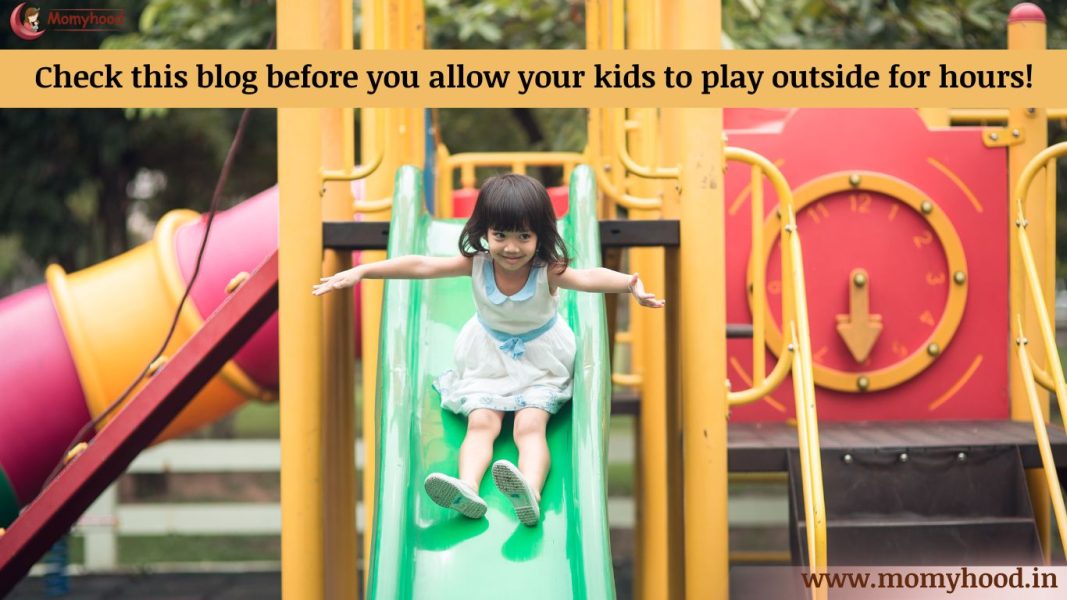Hello, I’m Anuradha, a parent just like you navigating the joys and challenges of raising a young child. As a mother to a vibrant 5-year-old, it’s natural to have concerns when your child starts showing signs of wanting more independence, especially when it involves activities like playing outdoors alone.
I recently faced a common parenting dilemma: how to support my son’s growing independence while also valuing the time we spend together at home. My 5-year-old began insisting on spending more time playing outdoors, inspired by his friends who seem to have endless playtime. While I fully support the benefits of outdoor activities, I also recognize the importance of a balanced routine and quality family time.
In my quest to find the best approach, I reached out to a group of fellow parents, and their insightful suggestions have been invaluable. Through this blog, I aim to share these experiences and strategies, offering practical tips to help you manage your child’s playtime, encourage independence, and maintain a healthy family dynamic.
Here are some key points and perspectives from the conversation:
Encouraging Independence Through Child Playing Outdoors
Many parents agree that it’s beneficial to encourage independence at an early age. Allowing children to explore and interact with their peers can help them develop social skills and self-confidence. If your society has good security, it might be a good idea to let your child play outside but with certain precautions.
One parent mentioned, “If he is having all the classes and time with you, let him explore outside. They grow more independent. Yes, of course, keep a check on his language and tone as you don’t know with whom he may learn what. But the best part is when he learns this is a proper age you can rectify or make him understand. Now there are good societies with security.”
Another mom shared, “My daughter was 5 when she started going alone and surprisingly she became more independent. She played 2 to 3 hours in the playground. If we control our kids they will start making excuses after a certain time. Yes, it depends on how your society’s security is. If it is secure let him play. After every half an hour, I used to check.”
📣 Loved what you read? Want to go deeper into conscious parenting? ✨ The Power of Manifestation in Parenting is now available — A soulful guide packed with real-life tools like affirmations, energy shifts, and sleep talk that I personally use with my son, Hitarth. 💛 Start your journey toward calmer, connected parenting today. 🎉 Launch Offer: Only ₹99 (limited-time price!) 📲 Instant download. No waiting. 👉 Grab your copy now!.
Encouraging exploration outside fosters independence but requires parental vigilance. “It is ok for your child playing outdoors but keep an eagle eye on him. Playing time from 5.30 to 7.30 max 8 pm should be the limit.”
Also read: Strategies for Initiating Conversations and Examples of Engaging Activities with Your Child
Setting Boundaries
It’s essential to set boundaries and establish a routine. While physical play is important, children also need to engage in other activities such as art, reading, and spending quality time with family. A balanced schedule can help ensure that your child gets a variety of experiences and learns to manage their time effectively.
One parent advised, “Make a timetable and routine; he will slowly understand and follow. Engaging at home is most important.”
Another shared, “I believe 2 hours are enough to play outside. When homework and studies increase, it becomes hard as their mind is in play, so study gets hampered. It depends on kids to kids!
Setting a balanced routine is vital. “Tell him he can play for 2 hours, take a break, come home and have a snack, then go back down if you feel like. Make a chart where you both can decide what else can be included in the day apart from play.”
Fostering Open Communication and Quality Time
Amidst the push for independence, maintaining open communication and spending quality time together remains fundamental. Regular conversations about their experiences, feelings, and any concerns, including those related to child playing outdoors, can help build trust and ensure they feel supported. Creating a space where your child feels comfortable sharing their thoughts can make a significant difference.
One parent said, ”I always encourage my child to talk about their day and how they feel about their activities. Engaging in activities together, whether it’s reading a book or playing a game, reinforces our bond and ensures they know they are valued and heard. Balancing their newfound independence with time spent together strengthens our relationship and provides a foundation of security.”
Another parent shared, “I always encourage my child to talk about what happens during her playtime. It helps me stay informed and shows her that her experiences and feelings matter.”
Ensuring Safety
Safety is a top concern for all parents. Some parents suggested using a tracking watch to keep an eye on the child’s location. Regularly checking in on them, either in person or through a secure communication device, can also provide peace of mind. It’s crucial to know who your child is playing with and to maintain open communication about their activities and whereabouts.
One parent said, “I started sending my kids alone once they were 6+ years old. And playtime is from 5-5.30 p.m. to 7-7.30 p.m – not more than 2-3 hours in any case.”
Another mom added, “Small kids, although wanting desperately to be independent, are still dreamers! You might send them alone with all instructions but they might wander off with friends or basement car parks. So better to let them think they are going to the play area alone, but you follow them and keep an eye on them.”
A different perspective was shared by another parent, “I used to go and sit for hours where he played with his friends and get him back! It was a tough time then but no other way. But when we started to leave him alone we still checked if the lift is going to 0/1.”
Avoid sending very young children alone due to potential safety risks and the mixed age groups in play areas. “At this age, he is finding his own way around friendships and social interaction. It’s advisable to lay down some norms for safety. For instance, you should always know where he’s going to be.”
Shared Experiences and Insights
Encouraging Exploration
Allowing children to explore outside fosters independence, but it’s important to monitor their behavior and interactions. “Let him play but keep an eagle eye on him. Playing time is too much; 5.30 to 7.30 max 8 pm should be the limit.”
Also read: Summer Smiles: Expert Tips for a Positive Summer and Stronger Families
Balanced Routine
Maintaining a balanced routine is essential, especially if the child has other commitments like therapies or studies. “Tell him he can play for 2 hours, take a break, come home and have a snack, then go back down if you feel like. Make a chart where you both can decide what else can be included in the day apart from play.”
Limiting playtime to ensure it does not interfere with other important activities like studies is crucial. “Playing for such long hours is not advisable. Sit with him and make a chart where you both can decide what else can be included in the day apart from play.”
Appropriate Playtime
Limiting playtime to ensure it does not interfere with other important activities like studies. “Playing for such long hours is not advisable. Sit with him and make a chart where you both can decide what else can be included in daytime apart from play.”
Regular Check-ins
Checking on children every half hour can help in maintaining a balance between independence and safety. “If your society is safe, let him play. After every half an hour, I used to check.”
Age-Appropriate Supervision
Avoid sending very young children alone due to potential safety risks and the mixed age groups in play areas. “At this age, he is finding his own way around friendships and social interaction. It’s advisable to lay down some norms for safety. For instance, you should always know where he’s going to be.”
Practical Tips for Parents
Create a Schedule
Involve your child in making a daily schedule that includes time for outdoor play, indoor activities, and family time. This can help them understand the importance of a balanced routine. “Make sure you sit with your child and plan his day. Let him take responsibility and make decisions. Doing this at an early age boosts their confidence.”
Safety Measures
If you child is playing outdoors alone, equip him with a tracking watch and set clear rules about where they can go and who they can play with. Regularly check in on them. “You can get a tracking watch for him. You can let him go play and still be around walking etc. 5 years is I feel too young though but as kids start seeking independence much earlier.”
Engage in Activities Together
Spend time with your child doing activities they enjoy, whether it’s playing sports, doing art, or reading together. This strengthens your bond and ensures they value family time. “I enrolled my daughter for music & abacus classes too …she was busy till evening. I think it’s about having a good balance to the child’s day between structured routine and unstructured play.”
Communicate
Keep an open line of communication with your child about their experiences and feelings, especially regarding child playing outdoors. Encourage them to share any concerns or exciting moments they have during their outdoor playtime. “Keep an open line of communication with your child about their experiences and feelings. Encourage them to share any concerns or exciting moments they have during their outdoors play.”
Monitor and Adjust
Pay attention to how your child adapts to the routine, including your child playing outdoors. If you notice any negative changes in their behavior or academic performance, reassess and adjust their schedule accordingly. “If it’s more of shouting and instructions, they try to get away. Basically, you should be able to see your child from your house without having to stop play, especially during their playing outdoors.”
Actionable Steps
- Sit down with your child and design a daily schedule that includes specific times for outdoor play, indoor activities, and family time. Make the schedule visually appealing by using charts or planners, and involve your child in the process to boost their understanding and adherence. Example: Allocate two hours for outdoor play in the afternoon, followed by time for homework, reading, or family activities. Adjust as needed based on your child’s feedback and daily needs.
- Equip your child with a tracking watch or similar device if they play outside independently. Set clear rules about where they can go and who they can interact with. Make it a routine to check in with your child periodically or use a secure communication device. Example: “Before your child goes outside, discuss where they will be playing and with whom. Set a specific time for you to check in or use a tracking app to monitor their location.”
- Establish a routine for discussing your child’s daily activities and feelings. Use engaging activities like storytelling or role-playing to make these conversations more enjoyable. Ensure that your child knows they can talk to you about anything, including their experiences while playing outside. Example: “After playtime, ask your child about their day and any new experiences. Share your own experiences and feelings to model open communication.”
- Pay attention to how well your child adapts to the routine and make adjustments if necessary. If you notice any changes in their behavior or academic performance, review the schedule and make changes to ensure a balanced approach. Example: “Observe how your child responds to the routine over a few weeks. If they seem overwhelmed or disinterested in other activities, consider adjusting the playtime or adding more variety to their schedule.”
By implementing these steps, you can help your child enjoy the benefits of outdoor play while maintaining a balanced routine that includes valuable family time and ensures their safety.
Conclusion
In conclusion, while it’s important to encourage independence in children, it’s equally crucial to ensure their safety and maintain a balanced routine, especially when it comes to child playing outdoors. By setting boundaries, communicating openly, and monitoring their activities, we can help our children grow into confident and well-rounded individuals.
How have you managed your child’s playtime and independence, particularly with outdoor play? Share your thoughts and experiences in the comments below!
Your comments and shares do more than just support our blog—they uplift the amazing moms who share their stories here. Please scroll down to the end of the page to leave your thoughts, and use the buttons just below this line to share. Your support makes a big difference!



